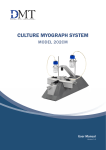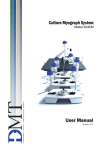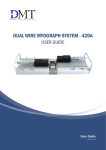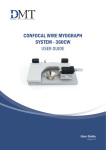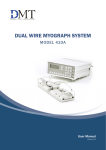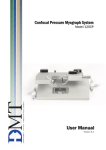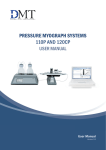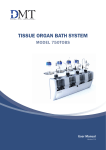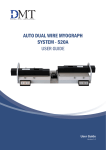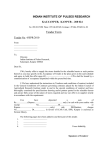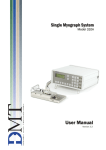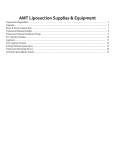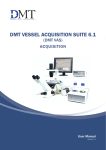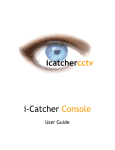Download User Manual 204CM
Transcript
CULTURE MYOGRAPH SYSTEM MODEL 204CM User Manual Version 1.6 1 2 CULTURE MYOGRAPH SYSTEM - MODEL 204CM USER MANUAL CULTURE MYOGRAPH SYSTEM MODEL 204CM TRADEMARKS Pentium is a registered trademark of the Intel Corporation. Windows, Windows 95, Windows 98, Windows ME, Windows NT, Windows 2000 and Windows XP are registered trademarks of Microsoft Corporation. VediView software is a trademark of Photonics Engineering. Euresys Picolo Frame grabber. All other trademarks are the properties of their respective owners. DMT A/S reserves the right to alter specifications as required. This document was, as far as possible, accurate at the time of printing. Changes may have been made to the software and hardware described since then. New information may be supplied separately. This documentation is provided with the DMT Culture Myograph System – Model 204CM Document Number: 204CM 001A All rights reserved. No part of this manual may be reproduced or transmitted in any form or by any means without the written permission of Danish Myo Technology A/S. Every attempt is made to ensure accurate information, misprints, construction- and specification changes can occur. Danish Myo Technology A/S reserves the right to alter/change content as required and without any notice. Copyright © Danish Myo Technology A/S TRADEMARKS 3 Contents Trademarks........................................................................................................................................................................................3 Safety .................................................................................................................................................................................................5 EMC/EMI ...........................................................................................................................................................................................6 Approvals ...........................................................................................................................................................................................6 Certificate of Conformity..................................................................................................................................................................7 About this Manual ............................................................................................................................................................................8 Chapter 1 - System Overview ........................................................................................................................................................ 10 1.1 Culture Myograph Unit .................................................................................................................................................................. 10 1.2 DMT Microscope ............................................................................................................................................................................ 11 1.3 Culture Myograph Heat Controller ................................................................................................................................................ 11 Chapter 2 - Setting up ................................................................................................................................................................... 12 2.1 The Complete Culture Myograph System – 204CM .................................................................................................................... 12 2.2 Setting up the Complete Culture Myograph System 204CM...................................................................................................... 13 2.3 Installation of DMT VAS................................................................................................................................................................. 13 2.4 Perfusion Flow Control .................................................................................................................................................................. 16 Chapter 3 - DMT 204CM Control Program .................................................................................................................................. 18 3.1 Control of Temperature and Light Intensity ................................................................................................................................. 18 Chapter 4 - Culture Myograph Manual......................................................................................................................................... 20 4.1 The Culture Myograph Unit ........................................................................................................................................................... 20 4.2 The DMT Microscope..................................................................................................................................................................... 24 4.3 Pressure Regulator ....................................................................................................................................................................... 24 4.4 Culture Myograph Maintenance ................................................................................................................................................... 25 Chapter 5 - Getting Started........................................................................................................................................................... 26 5.1 Dissection Protocol for Small Mesenteric Arteries ...................................................................................................................... 26 5.2 Mounting Protocol for Small Arteries ........................................................................................................................................... 29 5.3 Buffer Recipes ............................................................................................................................................................................... 30 Appendix 1 - Fuse Changing ......................................................................................................................................................... 32 Appendix 2 - System Specifications ............................................................................................................................................ 33 4 CULTURE MYOGRAPH SYSTEM - MODEL 204CM USER MANUAL Safety The Culture Myograph System has been designed for use only in teaching and research applications. It is not intended for clinical or critical life-care use and should never be used for these purposes: nor for the prevention, diagnosis, curing, treatment, or alleviation of disease, injury or handicap. • Do not open the unit: the internal electronics pose a risk of electric shock. • Do not use this apparatus near water. • To reduce the risk of fire or electric shock, do not expose this apparatus to rain or moisture. Objects filled with liquids should not be placed on the apparatus. • Do not block any ventilation openings. Install in accordance with the manufacturer’s instructions. • Do not install near any heat sources such as radiators, heat registers, stoves, or other apparatus that produce heat. • Only use attachments and accessories specified by the manufacturer. • Unplug this apparatus during lightning storms or when unused for long periods of time. • This apparatus must be earthed. • Use a three-wire grounding-type cord similar to the one supplied with the product. • Do not defeat the safety purpose of the polarized or grounding-type plug. A polarized plug has two flat blades, one being wider than the other. A grounding type plug has two blades and a third (round) grounding pin. The wide blade or the third prong is provided for your safety. If the provided plug does not fit into your outlet, consult an electrician for replacement of the obsolete outlet. • Be advised that different operating voltages require the use of different types of line cord and attachment plugs. Check the voltage in your area and use the correct type. See the table below: Voltage Line plug according to standard 110–125 V UL817 and CSA C22.2 No. 42. 220–230 V CEE 7 page VII, SR section 107-2-D1/IEC 83, page C4. 240 V BS 1363 of 1984. Specification for 13A fused plugs and switched and unswitched socket outlets. Protect the power cord from being walked on or pinched: particularly at power plugs and the point where they connect to the apparatus. Refer all servicing to qualified service personnel. Servicing is required when the apparatus has been damaged in any way; such as, the power-supply cord or plug is damaged, liquid has been spilled onto or objects have fallen into the apparatus, the apparatus has been exposed to rain or moisture, does not operate normally, or has been dropped. SAFETY 5 EMC/EMI This equipment has been tested and found to comply with the limits for a Class B Digital device, pursuant to part 15 of the FCC rules. These limits are designed to provide reasonable protection against harmful interference in residential installations. This equipment generates, uses and can radiate radio frequency energy and, if not installed and used in accordance with the instructions, may cause harmful interference to radio communications. However, there is no guarantee that interference will not occur in a particular installation. If this equipment does cause harmful interference to radio or television reception (which can be determined by monitoring the interference while turning the equipment off and on), the user is encouraged to correct the interference by one or more of the following measures: • • • • Reorient or relocate the receiving antenna. Increase the separation between the equipment and receiver. Connect the equipment into an outlet on a circuit different to that to which the receiver is connected to. Consult the dealer or an experienced radio/TV technician for help. Approvals Complies with the EMC standards: EMC 89/336/EEC: EN 50 081-1 and EN 50 082-1 FCC part 15, Class B CISPR 22, Class B Certified with the safety standards: EN 60 065 (IEC 60065) Complies with the safety standards: UL6500 CSA E65 6 CULTURE MYOGRAPH SYSTEM - MODEL 204CM USER MANUAL Certificate of Conformity DMT A/S, Skejbyparken 152, 8200 Aarhus N., Denmark, hereby declares its responsibility that the following product: Culture Myograph System– Model 204CM is covered by this certificate and marked with CE-label and conforms with the following standards: EN 60 065 (IEC 65) Safety requirements for mains operated Electronic and related apparatus for household and similar general use. EN 50 081-1 Electromagnetic compatibility – Generic emission standard Part 1: Residential, commercial and light industry. EN 50 082-1 Electromagnetic compatibility – Generic immunity standard Part 1: Residential, commercial and light industry. With reference to regulations in the following directives: 73/23/EEC, 89/336/EEC CERTIFICATE OF CONFORMITY 7 About this Manual This manual contains a complete list of procedures describing how to install, maintain and get started using the Culture Myograph System – Model 204CM – Version 1.6. Chapter 1 provides a comprehensive view of the construction and basic features of the complete Culture Myograph System. Chapter 2 describes step-by-step how to set-up a complete 204CM Culture Myograph System, including all various accessories. Chapter 3 describes Control of Temperature and Light Intensity Chapter 4 is a complete manual to the Culture Myograph System. The chapter describes in detail how to use the DMT microscope, how to use and adjust the culture myograph chamber and finally instructions for the daily maintenance of the Culture Myograph System. Chapter 5 contains procedures describing how to get started using the wire myograph system. This includes a complete dissection and mounting procedure. Appendixes contain additional information about fuse changing and system specifications. 8 CULTURE MYOGRAPH SYSTEM - MODEL 204CM USER MANUAL Unpacking the Myograph System Please take a few minutes to carefully inspect your new Culture Myograph System for any damage, which may have occurred during handling and shipping. If you suspect any kind of damage, please contact DMT immediately and the matter will be pursued as soon as possible. If the packing material appears damaged, please retain it until a possible claim has been settled. We recommend that you store the packing material for any possible future transport of the Culture Myograph System. In case of transport and the original packing material is unavailable, please contact DMT Sales Department for advice and packing instruction. After unpacking your new Culture Myograph System, please use the following list to check that the system is complete: 1. Culture Myograph Unit: • Culture Myograph Chamber with Chamber Cover. • 2 Glass Cannulas (Tip outer diameter 125µm). • 2 Schott Duran Bottles 25ml. 2. DMT Microscope: • Temperature Probe. • Olympus Objective Micrometer including Microscope Objective Holder. 3. Culture Myograph Heat Controller Unit: • USB-cable for connection to PC. • Power cord (The shape of the AC plug varies by country; be sure that the plug has the right shape for your location). 4. Pressure Regulator 5. Accessories: • Small Screwdriver. • 3 m. Nylon Suture. • 2 blind plugs including six O-rings (1.07×1.27mm) for the Culture Myograph Chamber. • 10 O-rings (5.0×1.0mm) for fixation of left glass cannula. • 10 O-rings (18.0×1.27mm) for cover 6. Software & Manuals: • 1 CD with user manual for “Culture Myograph System – Model 204CM”. • 1 CD with DMT Vessel Acquisition Suite (DMT VAS) 7. Peristaltic Pump (Optional): • Alita Watson Marlow 400, VS2-10R-Midi, 2.5-50rpm 8. Computer (Optional) UNPACKING THE MYOGRAPH SYSTEM 9 Chapter 1 - System Overview 1.1 Culture Myograph Unit Cable to myoInterface Micropositioner for longitudinal regulation of right glass cannula Vertical regulation plate for left glass cannula O-ring locks fixing the left glass cannula Fixation and longitudinal regulation plate for right glass cannula Screw for horizontal regulation of both glass cannulas Superfusion outlet Left glass cannula (Tip outer diameter 125µm) Right glass cannula (Tip outer diameter 125μm) Myograph chamber access hole for left glass cannula Myograph chamber access hole for right glass cannula Culture myograph unit / chamber assembly mark Superfusion inlet Figure 1.1 Culture Myograph Chamber Unit 10 CULTURE MYOGRAPH SYSTEM - MODEL 204CM USER MANUAL 1.2 DMT Microscope Lever to fasten culture Myograph Unit (Fig. 1.1) Light intensity regulation plug Plug for connection of temperature probe Infrared light scource Zeiss Achromat 10X / 0.25 objective X Y Z level regulation of objective focus Figure 1.2 DMT Microscope 1.3 Culture Myograph Heat Controller Power ON Led Connection to the Culture Myograph Units Power Inlet USB-Port for Connection to Computer ON / OFF Switch Figure 1.3 Heat Controller CHAPTER 1 11 Chapter 2 - Setting up 2.1 The Complete Culture Myograph System – 204CM Culture Myographs Filter Peristaltic Pump (Optional) DC Adapter (90-240V) (Rear Panel) PC Frame Grabber Connection DMT Microscope Heat Controller Front Panel Pressure Regulator Front Panel Waste Bottle Power Heat Controller Rear Panel USB Connections PC Data Acquisition and Analysis Software (Optional) Oxygen Supply Superfusion Buffer Outlet Superfusion buffer Inlet Superfusion buffer Inflow Perfusion buffer Electrical connections Figure 2.1 Setting up step by step NOTE: IF YOU HAVE PURCHASED A COMPUTER FROM DMT IN CONJUNCTION WITH YOUR CULTURE MYOGRAH 204CM SYSTEM THE DMT VAS HAS ALREADY BEEN INSTALLED ALONG WITH DRIVERS. FOLLOW THE PROCEDURES IN SECTION 2.2 TO SET-UP THE CULTURE MYOGRAPH SYSTEM. IF YOU HAVE NOT PURCHASED A COMPUTER FROM DMT, PLEASE FOLLOW THE PROCEDURES IN SECTION 2.3 TO INSTALL THE DMT VAS ON YOUR OWN COMPUTER. 12 CULTURE MYOGRAPH SYSTEM - MODEL 204CM USER MANUAL 2.2 Setting up the Complete Culture Myograph System 204CM This section describes how to connect the cables in the culture myograph system as illustrated in Fig. 2.1. Before connecting any of the myograph equipment, ensure that the frame grabber card is installed into the PCI slot of the computer. Please see installation instructions in Section 2.3. 1. Ensure that the heat controller is switched off, on the rear panel before proceeding with the connection procedure. 2. Connect the loose cables from the four culture myograph units to the front panel of the heat controller. 3. Connect the power cord to the power inlet on the back panel of the heat controller. 4. Connect the Heat Controller to the PC with the loose USB cable using the USB port on the Heat Controller and a free USB port on the PC. 5. Connect the DMT Microscope to a USB port on the computer using the fixed USB cord. 6. Turn on the power switch of the heat controller. 7. The Power ON LED on the front panel of the heat controller should be lit indicating that the heat controller is on. 8. Connect the DSUB 9-pol cable from the DMT microscope to the 9-pol port on the frame grabber card installed in the computer. 9. Turn on the computer. 2.3 Installation of DMT VAS This section describes how to install the DMt VAS on your computer along with drivers for the digital USB camera. NOTE: IF YOU HAVE PURCHASED A COMPUTER FROM DMT IN CONJUNCTION WITH YOUR CULTURE MYOGRAPH 204CM SYSTEM THE DRIVERS AND DMT VAS HAVE ALREADY BEEN INSTALLED FOR YOU. 1. Installing the USB camera A. If a DMT microscope was part of the system (111P, 202CM or 204CM), then the USB camera is inside the microscope. Simply connect the USB connector labeled “CAM” into a free USB port on your computer. If your system is a 110P, then your camera needs to be installed on the microscope and the USB cable that came with the system needs to be connected to the camera and the camera connected to the computer through a free USB port. B. Your computer will look for drivers for the camera. Cancel this process. You will load the drivers on your own. C. Insert the CD from The Imaging Source. D. The first screen that comes up with the CD inserted will ask you for your language preference. Choose your preferred language. E. The next screen that loads will have 2 choices: - How to use this CD - Software installation F. Click on Software installation. Three new options will appear: - Driver - Software for end users - Software for programmers G. Click on Driver. Select USB Cameras. H. The next screen will welcome you to the Driver Installation Wizard. Click next after selecting USB Camera, if it hasn’t already been selected. I. You may get a screen that indicates that the software you are installing for this hardware has not passed Windows Logo testing. Click on Continue Anyway. CHAPTER 2 13 J. The next screen will indicate the installation is completed. Click on Finish. Click on Back. 2. Installing IC Capture A. IC Capture is installed from Software for end users. Click on Software for end users. B. Click on IC Capture. This is the first option to select. C. Click on the first option, IC Capture. This will continue to load the IC Capture software. D. Click on Next when the IC Capture Setup Wizard screen appears. E. You will need to agree to the License Agreement to proceed. F. On the next screen, enter your User Information and License Key, which is found on the front of the CD sleeve. Click on Next. G. The Installation program will ask you where you want to install the software on your hard-drive. Once you have determined an appropriate drive and folder, click Next. H. The IC Capture software will be installed. Click Finish. 3. Turning Off the Auto-Shutter Function of the Camera A. Launch the IC Capture 2.1 software. When you first launch the software, it will ask you to recognize a camera. The camera will be listed as DMx 41AU02.AS. B. On your keyboard, press CTRL+5. C. A tool bar should appear with Gain and Exposure. Unclick the auto functions. This just turned off the auto-shutter functions of the camera. D. Close the IC Capture software. 4. Installing the DMT Vessel Acquisition Suite (DMT VAS) software A. At this point, the camera should be installed and functional. B. Install the DMT VAS software by double-clicking on the dmt-09Mar10.exe file that came on your CD or that you downloaded. C. This will automatically install the software to your C: drive. D. Open your C: drive, and you will find a stand-alone folder, dmt. E. Open the dmt folder. F. Open the current folder. G. Find the application file, DMTvas. H. Double-clicking on the DMTvas application file will open the program. I. 14 If you wish, you may create a short-cut to this application file and placet this short-cut on your desktop or in your Start menu. CULTURE MYOGRAPH SYSTEM - MODEL 204CM USER MANUAL 2.3 Experiment Setup 2.3.1 Connecting the Flow-Reservoirs To connect the flow reservoirs with the glass cannulas and the Pressure Regulator, DMT recommends PharMed™ tubes (Product No. 100127 ): NOTE: A STERILE MICRO FILTER (0.20ΜM) IS CONNECTED BETWEEN THE PRESSURE MANOMETER RESERVOIR AND THE TWO PERFUSION RESERVOIRS TO PREVENT CONTAMINATION OF THE PERFUSION BUFFER. Figure 2.2 Illustration of how to connect flow reservoirs. CHAPTER 2 15 2.4 Perfusion Flow Control Regulating the difference in height between the two flow reservoirs allows control of the perfusion flow velocity. The principle is illustrated in Fig. 2.3. In Fig. 2.3A the two reservoirs are equal in height and no flow will occur. In Fig. 2.3B the difference in height reveals a flow from the right reservoir to the left reservoir. NOTE: TO ENABLE THE PERFUSION FLOW, IT IS IMPORTANT THAT THE RIGHT GLASS CANNULA IS CONNECTED TO THE LONG STEEL PIPE IN THE RIGHT RESERVOIR (MARKED BY THE ARROW IN FIG. 2.3 A). A B Figure 2.3 A and B Illustration of perfusion flow control 16 CULTURE MYOGRAPH SYSTEM - MODEL 204CM USER MANUAL 2.4.1 Setup and Control of Superfusion Flow Peristaltic Pump Micro Filters Culture Myograph Chamber Superfusion Buffer Oxygen Supply Waste Bottle Figure 2.4 Illustration of perfusion flow control The superfusion circuit consists of an inflow and an outflow from the culture myograph chamber. Both flows are driven by the same peristaltic pump, which leads the superfusion buffer from the reservoir to the culture myograph chamber and finally to a waste bottle. The small steel pipe on the culture myograph chamber cover is connected to a sterile micro filter (0.20µm). The small pipe works as a breathing valve to prevent over pressure in the culture myograph chamber. The superfusion buffer reservoir is continuously aerated with a mixture of 95% O2 and 5% CO2. The gas passes through a sterile micro filter (0.20µm) to prevent contamination of the sterile superfusion buffer. CHAPTER 2 17 Chapter 3 - DMT 204CM Control Program 3.1 Control of Temperature and Light Intensity In addition to the DMT VAS, a program is installed on the computer allowing temperature and light intensity control of the Culture Myograph 204CM system. To run the DMT 204CM control program, please select the “204CM controller” which was copied to your desktop during installation. “204CM controller” can also be found in START->All Programs->DMT->204CM NOTE: MAKE SURE THAT THE HEAT CONTROLLER IS TURNED ON AND THE MICROSCOPE IS CONNECTED TO THE FRAME GRABBER, BEFORE RUNNING THE 204CM CONTROLLER. 3.1.1 Connecting the Heat Controller and the Microscope When the 204CM Controller is started it will automatically connect to the Microscope and Heat Controller. In the About Tab, the status of the COM connections is shown. If the connection fails please check that the Microscope and Heat Controller is turned on, and that the USB cables is connected. Set-temperature The temperature controller tab is used to adjust the set temperature for each chamber (range: 10 - 450 C with 0.10 C accuracy). If a temperature is changed, click the button Change and the change is up loaded to the heat controller. The setting is permanently stored in the heat controller. Status: “Status” indicates status for each chamber: The Myograph is not connected to the heat controller. The Myograph is connected. The heat has not reached set temperature. The Myograph is connected. The heat has reached set temperature. 18 CULTURE MYOGRAPH SYSTEM - MODEL 204CM USER MANUAL Actual Temperature The microscope controller tab shows the actual temperature measured in the chamber placed on the microscope. Light Intensity To change the light intensity, use the track bar. The options are as follows: 1. Use the mouse to drag the slider up and down. 2. Use Arrow UP and Arrow DOWN, to change the IR light intensity with one step. 3. Use Page UP and Page DOWN to change the IR light intensity with ten steps. 4. Use Home and End, to force the IR light fully off or on. 5. To manually adjust the IR light intensity, adjust the knob on the back of the microscope. Chapter 3 19 Chapter 4 - Culture Myograph Manual 4.1 The Culture Myograph Unit The culture myograph unit is placed on the DMT microscope as illustrated in Fig. 4.1. Press the black lever to lock the culture myograph unit onto the DMT microscope. 4.1.1 Glass Cannula Adjustment The glass cannulas are adjustable in all X Y Z directions. The adjustments are illustrated in Fig. 4.1 Horizontal adjustment, please see fig. 4.2 Vertical adjustment Longitudinal adjustment Myograph unit lock Figure 4.1 Illustration of glass cannula adjustment 20 CULTURE MYOGRAPH SYSTEM - MODEL 204CM USER MANUAL Horizontal Adjustment: Horizontal adjustment is performed as illustrated in Fig. 4.1 and 4.2. Gently loosen the screw fixing the chamber and carefully move the myograph chamber in either clockwise or counter clockwise direction to adjust the horizontal alignment of the glass cannulas. Horizontal Adjustment Screw: Loosen this screw and carefully turn CW or CCW. Observe how the pippettes move in horisontal plane. Figure 4.2 Horizontal adjustment of glass pipettes Vertical Adjustment: Vertical adjustment is performed as illustrated in Fig. 4.1. Gently turn the black dish, underneath the left glass cannula, CW or CCW to adjust the vertical alignment of the glass cannulas. Longitudinal Adjustment: Longitudinal adjustment of the glass cannulas is performed using the micro positioner on the right side of the culture myograph unit. CHAPTER 4 21 4.1.2 Removal and Mounting of Glass Cannulas and Chamber Replacement of glass cannulas and demounting of the culture myograph chamber for sterilisation are common routines in culture myograph experiments. The procedure is illustrated in Fig. 4.3. Fixation screw O-rings Lock-screw Figure 4.3 How to free the glass cannulas from the culture myograph unit Removal of Left Glass Cannula: Carefully remove the two O-rings (marked by the two arrows) to free the glass cannula from the culture myograph unit. Then carefully unscrew the locknut and remove both locknut and glass cannula. Removal of right Glass Cannula: Gently remove the little screw (marked by the arrow) to free the glass cannula from the culture myograph unit. Then carefully unscrew the locknut and remove both locknut and glass cannula. Removal of Culture Myograph Chamber: After removal of both glass cannulas, loosen the horizontal adjustment screw to free and remove the chamber from the culture myograph chamber. Mounting of all parts is performed the same way, but in opposite direction. 22 CULTURE MYOGRAPH SYSTEM - MODEL 204CM USER MANUAL 4.1.3 Changing O-rings Each locknut on the culture myograph chamber is equipped with rubber O-rings (ø1.07 x 1.27mm) to keep the chamber tight. These O-rings will from time to time need to be replaced. The procedure is illustrated in Fig. 4.4. Figure 4.4 Changing O-rings. • Unscrew the locknut to reveal the O-ring and remove it carefully using small forceps or a similar tool. • Insert the new O-ring into the chamber hole and push it back until it makes contact with the bottom of the hole. • Carefully insert the glass cannula through the locknut and place it in the chamber hole. Gently tighten the locknut. NOTE: BE CAREFUL NOT TO DAMAGE THE GLASS CANNULA TIPS WHEN DISASSEMBLING THE CULTURE MYOGRAPH CHAMBER. CHAPTER 4 23 4.2 The DMT Microscope The DMT microscope is an invert microscope equipped with a Zeiss Achromat 10X / 0.25 objective and build-in digital USB CCD camera. The objective is adjustable in all X Y Z directions using the three micro positioners on the front as illustrated in Fig. 4.5. Figure 4.5 How to adjust the position and focus of the microscope in the X Y Z directions. The DMT VAS obtains an image by measuring the differences in light intensity passing through the walls of a vessel segment mounted in the culture chamber. Traditionally a white light source is sufficient for such a purpose, but has one major disadvantage. A white light source makes the data acquisition and analysis very sensitive to changes in white light intensity from the surroundings, such as ambient light and sunlight. To avoid the surroundings influencing the data acquisition and analysis, the DMT microscope has a built-in infrared light source. 4.3 Pressure Regulator The Pressure Regulator is connected to the culture myograph system to generate a pressure on the mounted vessel from the perfusion buffer. The pressure is adjusted using the knob and air release valve shown in Fig. 4.6. Figure 4.6 Pressure Regulator 24 CULTURE MYOGRAPH SYSTEM - MODEL 204CM USER MANUAL 4.4 Culture Myograph Maintenance The Culture Myograph System – Model 204CM is a very delicate and sophisticated piece of research equipment. In order to keep it working at its best, DMT recommend that the following sections are read carefully and that the instructions are followed at all times. DMT strongly recommends that the myograph chamber and surroundings be cleaned after each experiment. After a “normal” experiment use the following procedure to clean the myograph chamber and glass cannulas: 1. Fill up the myograph chamber to the edge with an 8% acetic acid solution and allow it to stand for a few minutes to dissolve calcium deposits and other salt build-up. Use a swab stick to mechanically clean all chamber surfaces. 2. Remove the acetic acid and wash the myograph chamber and glass cannulas several times with double distilled water. 3. It is hard to remove any kind of hydrophobic reagent used by using step 1. and 2., try incubating the chamber and glass cannulas with 96% ethanol or a weak detergent solution (e.g. Treepol). 4. To remove more resistant or toxic chemicals, incubate the myograph chamber and glass cannulas with 1M HCl for up to 1 hour. In exceptional cases incubate the chamber and supports with a up to 3M HNO3 solution for about 15 minutes. 5. Wash the myograph chamber and glass cannulas several times with double distilled water. IMPORTANT NOTES: • TO STERILIZE THE CULTURE MYOGRAPH CHAMBER AND GLASS CANNULAS, USE A STANDARD AUTOCLAVE PROCEDURE. • BE VERY CAREFUL USING STEP 3 AND 4 REPEATEDLY AS STRONG REAGENTS CAN CAUSE EXTREME DAMAGE TO THE MYOGRAPH UNIT. • BE VERY CAREFUL NOT TO DAMAGE THE GLASS CANNULAS DURING THE CLEANING PROCEDURE. In cases of red or brown discolorations appearing on the chamber sides, the following cleaning procedure will work in most cases: 1. Incubate the myograph chamber for 30 minutes with 20µl of a 2mM T-1210 Tetrakis-(2-pyridylmethyl)-ethylenediamine solution dissolved in double distilled water. 2. Use a swab-stick to mechanically clean all the affected surfaces during the last 15 minutes of the incubation period. 3. Wash the myograph chamber several times with double distilled water. 4. Incubate the myograph chamber with 96% ethanol for 10 minutes while continuing the mechanical cleaning with a swabstick. 5. Remove the ethanol solution and wash a few times with double distilled water. Incubate the myograph chamber with an 8% acetic acid solution for 10 minutes and continue the mechanical cleaning with a swab-stick. 6. Wash the myograph chamber several times with double distilled water. CHAPTER 4 25 Chapter 5 - Getting Started 5.1 Dissection Protocol for Small Mesenteric Arteries The culture myograph technique is versatile in that a large variety of physiological and pharmacological studies of ring preparations from different species can be performed. Mostly, the culture myograph is used for investigation of small blood vessels and as an example this chapter describes the dissection of rat mesenteric arteries. 1. A laboratory rat is euthanized in accordance to the local national law and regulations. A midline laparotomy is performed to expose the mesenteric bed. 2. Use scissors to remove about 10cm of intestine along with its feeding vasculature, including part of the superior mesenteric artery. Be careful not to damage the vasculature during this procedure. The proximal end of the intestine section must be about 10cm from pylorus. Make a cut in the proximal end of the intestine for later identification. 3. Place the excised intestine section in a Petri dish (about 9cm in diameter) coated with a 5mm thick layer of Sylgard at the bottom to hold the fixing pins. Immediately fill the Petri dish with cold PSS well prebubbled with carbogen (see Chapter 5.3). The dissection is performed without further oxygenation of the PSS. 4. Pin down the proximal end of the intestine section on the left-hand side of the Petri dish without stretching the vessels. Pin down the remaining of the intestine section in an anti-clockwise direction. In this configuration (proximal end at the left side, distal end at the right side and running anti-clockwise from proximal to distal side) the feeding vasculature is on the far side of the intestine and the veins are usually uppermost. 5. Select the vessel segment to be investigated (Fig. 5.1). First time myograph users are recommended to start dissecting and mounting vessel segments from the first or second branch from the superior mesenteric artery (approximate internal diameter 200-300µm). Second Branch First Branch Figure 5.1 Branch of the mesenteric arteries 26 CULTURE MYOGRAPH SYSTEM - MODEL 204CM USER MANUAL 6. Use high quality forceps and ocular dissection scissors to dissect the vessel segment of interest. Start cutting through the mesenteric membrane along both sides of the vessel, about 1-2mm from the vessel. To avoid accidentally cutting the artery always cut along the length of the vessels and never perpendicular to them (Fig. 5.2 A-B). B A Figure 7.2 Removal of adipose tissue around the area of interest 7. Dissect away as much adipose tissue as needed around the vessels to distinguish between the artery and vein. The artery can easily be identified by the following characteristics (Fig 5.3): • The branch points of arteries are V-shaped whereas those of veins are more U-shaped. • The arterial wall contains a thick layer of smooth muscle cells compared to the vein wall, which only contains a single or a few layers of smooth muscle cells. The histological difference is clearly visible in the stereo microscope. • If you still have difficulty and the vein and artery still contain some blood then try to move the blood forward by very gently squeezing the vessels with a forceps. In the artery the blood will run back quickly whereas in the vein the blood will run back very slowly if it even does so. Note, it is important that you perform this on vessels other than those you will use as this procedure damages the vessels. Vein “U-shaped” Artery “V-shaped” Figure 5.3 Distinguishing between artery and vein CHAPTER 5 27 8. Dissect away the vein using scissors to cut the adipose and connective tissue between the artery and vein. One method is to cut the vein in one position and afterwards gently to pull the vein away from the artery. In this way a fine membrane of connective tissue becomes visible between the adipose tissue and the artery. Carefully cut the fine membrane to remove the vein and adipose tissue while avoiding any direct contact between the scissor and artery (Fig. 5.4 A-B). A B Figure 5.4 Removal of vein 9. Clean the artery by removing any remaining adipose or connective tissue. Gently pull away adipose or connective tissue to make the connective tissue membrane become visible. Cut the membrane to remove the tissue. 10. Cut the distal end of the artery section to be investigated. Afterwards cut the proximal end while ensuring that the vessel segment has the correct length (Fig. 5.5 A-C). B A C 28 Figure 5.5 A, B and C Cutting free the artery to be studied CULTURE MYOGRAPH SYSTEM - MODEL 204CM USER MANUAL 5.2 Mounting Protocol for Small Arteries This section shortly describes the basic technique of mounting small vessels in the culture myograph: • One end of the vessel is care-fully mounted and secured (with two fine nylon sutures) to one of the hollow glass microcannulas. • The lumen is flushed gently with PSS to remove any blood or debris. • The second end of the vessel is then mounted and secured to the second micro-cannula. • The PSS in the myograph chamber is gradually warmed to 370C over a periode of 15 minutes. Figure 5.6 Mounting of vessel in the culture myograph Figure 5.7 Vessel secured to the two glass CHAPTER 5 29 5.3 Buffer Recipes 5.3.1 Physiological Saline Solution (PSS) 1x PSS (1000ml): Solution 1: Chemical NaCl KCl MgSO4 - 7H2O KH2PO4 MW (g/mol) 58.44 74.56 246.48 136.09 Conc. (mmol/l) 118.99 4.69 1.17 1.18 Conc. (g/l) 6.954 0.350 0.289 0.161 Solution 2: Chemical CaCl2 - 2H2O MW (g/mol) 147.02 Conc. (mmol/l) 2.50 Conc. (g/l) 0.368 Solution 3: Chemical NaHCO3 EDTA Glucose MW (g/mol) 84.01 372.24 198.77 Conc. (mmol/l) 25.00 0.03 5.50 Conc. (g/l) 2.100 0.010 1.091 a) Dissolve the chemicals in approximately 100ml double distilled H2O as three individual solutions as described in the table above. Gently heat solution 3 to dissolve the EDTA. b) Solution 1 is added to a graduated bottle and the bottle is filled with double distilled H2O to a final volume of 500ml. c) Solution 3 is added to the graduated bottle, which afterwards is filled with additional double distilled H2O to a final volume of about 850ml. d) Aerate the solution with carbogen (95% O2 + 5% CO2) for about 20 minutes. e) Solution 2 is added and the graduated bottle is filled with additional double distilled H2O to reach the final volume of 1000 ml. Continue the carbogen bubbling until the pH of the buffer solution reaches 7.4. 25x Concentrated PSS (1000ml) Solution 1: Chemical NaCl KCl CaCl2 - 2H2O MW (g/mol) 58.44 74.56 147.02 Conc. (mmol/l) 118.99 4.69 2.50 Conc. (g/l) 173.850 8.750 9.200 Solution 2: Chemical MgSO4 - 7H2O KH2PO4 MW (g/mol) 246.48 136.09 Conc. (mmol/l) 1.17 1.18 Conc. (g/l) 7.225 4.025 Solution 3: Chemical EDTA MW (g/mol) 372.24 Conc. (mmol/l) 0.03 Conc. (g/l) 0.250 a) Dissolve the chemicals for solution 1 in about 800ml double distilled H2O in a 1000ml graduated bottle. Dissolve the chemicals for solutions 2 and 3 in 75ml double distilled H2O in individually cylinders. Gently heat solution 3 to dissolve the EDTA. b) Solution 2 and 3 is added to solution 1 and the graduated bottle is filled with additional double distilled H2O to reach a final volume of 1000.0ml. 30 CULTURE MYOGRAPH SYSTEM - MODEL 204CM USER MANUAL Before use: c) Dilute the 25 x PSS stock solution 1:25 using double distilled H2O. d) Add 1.091 g/l Glucose 2.100 g/l NaHCO3 e) Aerate the solution with carbogen (95%O2 + 5%CO2) for at least 20 minutes. If necessary wait further for the pH of the buffer to reach pH 7.4. CHAPTER 5 31 Appendix 1 - Fuse Changing The main fuse of the myograph system is placed inside the power inlet on the Heat controller. If the fuse blows it is easily changed using the following procedure. IMPORTANT: IF THE FUSE NEEDS TO BE CHANGED, MAKE SURE THAT THE REPLACEMENT FUSE IS EQUAL TO THE ONE BLOWN. Specifications: T2A / 250V, 6.3 x 32mm Use a small screwdriver to open the voltage selector block Red Fuse Block Fuse 32 CULTURE MYOGRAPH SYSTEM - MODEL 204CM USER MANUAL Fuse Appendix 2 - System Specifications Technical specifications Chamber Unit Vessel size: Chambers: Chamber volume: Cannula ports: Superfusion ports: Base window: Chamber material: Chamber cover: >60 μm Four Max. 2 ml O.D. 1.2 mm Built-in 10 mm diameter type ll coverslip Acid-resistant stainless steel Removable with gasket and access port Chamber Stage Alignment: Adjustment: Flow: Temp. range: Temp. control: Temp. probe: Two cannula holders X, Y & Z 25ml bottles for flow adjustment Ambient temp - 50 °C Via PC software Included Microscope Stand Camera: Objective: Adjustment: Light source: Voltage: USB ½” B/W CCD 10x X, Y & Z directions Infrared LED 100 to 240 VAC (auto) 50/60 Hz Pressure Regulator Pressure range: Pressure source: 0 - 300 mmHg Atmospheric pressure Heat controller Temperature range: Max 50 °C Pump Peristaltic pump: 2.5 - 50 rpm (for superfusion of the chamber) 4-8 channel versions available Optional accessories FlowMeter - range: 15 μl/min to 1500 μl/min APPENDIX 2 33 Aalborg Hospital South • Academic Medical Center Amsterdam • Academy of Sciences of the Czech Republic • Actelion Pharmaceuticals Ltd • Ahmadu Bello University • Akzo Nobel/Organon • Albert Einstein College of Medicine • Albert-Ludwigs-Universität Freiburg • Arete Therapeutics • Aarhus Kommunehospital • Arizona State University • Asterand UK Ltd. • Aston University • AstraZeneca • AstraZeneca R&D Mölndal • Aventis Pharma • Bayer HealthCare AG • Baylor College of Medicine • Bristol-Myers Squibb • Brock University • Bulgarian Academy of Sciences • Campus Charité Mitte • Cardiff University • Case Western Reserve University • Charles University • Childrens Hospital of Pittsburgh • Chinese University of Hong Kong • Christian-Albrechts-Universität zu Kiel • Clinica Medica, PUGD Udine • CNRS d’Orléans • CNRS UMR 6097 • Columbia University • Copenhagen Hospital Glostrup • Copenhagen University • Cork University Maternity Hospital • Cornell University • Coventry University • CV Therapeutics Inc. • Cytokinetics Inc. • Daegu Catholic University • Deakin University • Der Universität Freiburg • Der Universität Im Neuenheimer Feld 326 • Deutsche Forschungsgemeinschaf (DFG), Bonn • Duke University • Duke University Pharmacology • Dundalk Institute of Technology • East Carolina University • Eastern Virginia Medical School • Ecole Polytechnique Fédérale De Lausanne • Ege University • Emory University • Emory University, School of Medicine • Erasmus Universiteit Rotterdam • Federal University of Minas Gerais • Ferring Research Institute Inc. • Florida Atlantic University • Florida International University • Forschungsverbund Berlin E.V. • Fourth Military Medical University • Franz-Volhard-Clinic • Free University Berlin • Freie Universität Berlin • Friedrich Schiller University • Fudan University • Georgetown University • Glasgow Caledonian University • Glasgow University • GlaxoSmithKline • Glenfield Hospital • Göteborg University • Grand Vally State University • Harefield Hospital • Harvard Medical School • Harvard University • Hebei Medical University • Henry Ford Health System • Hospital Clinic (Barcelona) • Hospital Lariboisiere • Hospital Ramón y Cajal (Madrid) • Hospital Universitario de Getafe (Madrid) • Hospital Universitario La Fe (Valencia) • Hospital Universitario Virgen del Rocío (Sevilla) • Humboldt Universität zu Berlin • ICBM University of Chile • Imperial College London • Indiana University • INSERM U541 • INSERM U637 • INSERM U644 • INSERM U772 College de France • Inserm U858 • Institut de Pharmacologie Moléculaire et Cellulai • Institut De Recherches Cliniques De Montréal • Institute of Cellular Biology and • Institute of Immunology & Physiology • Istanbul University • J.W. Goethe-Universität • Jagiellonian University • James Cook University • Johann-Wolfgang-Goethe-Universität • Johns Hopkins University • Juntendo University • Justus-Liebig-Universität Giessen • Kaohsiung Medical University • Karolinska Institute • KAS Glostrup • Katholieke Universiteit Leuven • King’s College London • King’s College London GKT School of Medicine • KK Women’s and Children’s Hospital • Klinikum Der Universität Zu Köln • København Universitet • Korea University • Laboratorios Almirall (Barcelona) • Linköping University • Liverpool University • Loma Linda University • Loyola University At Chicago • Ludwig Maximilians University • Lund Universitet • Lundbeck Pharmaceuticals • Luther College • M.V.Lomonosov Moscow State University • Manchester Royal Infirmary • Manchester University • Manitoba Institute of Child Health • Marquette University • Martin-Luther Universität Halle-Wittenberg • Massachusetts General Hospital • Max-Delbrück-Centrum • Mayo Clinic • McMaster University • MDC Berlin • Medical College of Georgia • Medical College of Wisconsin • Medical University of South Carolina • Memorial University Of Newfoundland • Michigan State University • Mogiglass Artigos Para Laboratorio LTDA • Monash University • Mount Sinai School of Medicine • Nanyang Technological University • Nat. Inst. Of Pharnaceutical Education & Research • National Defencse Medical Center • National Institute on Aging • National University of Ireland • NeuroSearch A/S • Neurox Pharmaceuticals LLC • New York Medical College • New York Presbytarian • North Carolina Central University • North Sichuan Medical College • Norwegian Univ Sci Tech • Novo Nordisk A/S • Ohio State University • Ono Phamaceutical Co., Ltd. • Oregon Health And Science University • Orthologic Corp. • Pathology “Nicolae Simionescu” • PDL BioPharma • Pennsylvania State University • Pfizer Ltd. • Philipps Universität • Proteon Therapeutics • Queen Mary University London • Queen’s University • Queens University Belfast • Radboud University Nijmegen Medical Centre • Ranbaxy • RMIT University • Robert Gordon University • Royal College Of Surgeons In Ireland • Ruhr-Universität Bochum • Saarland University • Saint Louis University • Samsung Deutschland GmbH • Sanofi-Aventis • Shanghai Institute of Materia Medica • Skejby Sygehus, Aarhus • Slovak Academy of Sciences • SmithKline Beecham • South Florida VA Hospital • St. George’s Hospital • St. Paul’s Hospital • St. Thomas’ Hospital, London • State University of New York • Stony Brook University • Sultan Oaboos University • Swedish Defence Research Agency, FOI • Swiss Cardiovascular Ct. Bern • Swiss Federal Institute Of Technology • Syddansk Universitet • Technischen Universität Dresden • Technischen Universität München • Temple University School of Medicine • Texas A&M University HSC • Texas Southern University • The American Cardiovascular Research Institute • The Australian National University • The Chinese University of Hong Kong • The Cleveland Clinic • The College Of William & Mary • The Edith Wollfson Medical Center • The John Curtin School of Medical Research • The Ohio State University School of Public Health • The Panum Institute, Copenhagen • The University of Alabama At Birmingham • The University of Chicago • The University of Edinburgh • The University of Hong Kong • The University of Liverpool • The University of Naples -Federico II • The University of Newcastle • The University of Queensland • The University of Sydney • The University of Texas Medical Branch • Theravance, Inc. • Tokyo Medical and Dental University, School of Medicine • Tufts University • UCL Université Catholique • UHI Millennium Institute • Ulleval University Hospital • Universidad Autónoma de Barcelona • Universidad Autónoma de Madrid • Universidad Complutense de Madrid • Universidad de Castilla-La Mancha (Albacete) • Universidad De Chile • Universidad De Murcia • Universidad de Salamanca • Universidad de Santiago de Compostela • Universidad de Sevilla • Universidad de Valencia • Universidade Do Estado Do Rio De Janeiro • Universit Milano Bicocca • Universitá Degli Studi De Torino • Universitá Degli Studi Di Brescia • Universitaet Göttingen • Universitaet Hamburg • Universität Bern • Universität Geissen • Universität Göttingen • Universität Hamburg • Universität Heidelberg • Universität Klinikum Der JWG • Universität Marburg • Universität Regensburg • Universität Rostock • Universität Tübingen • Üniversität Zürich • Universitätshospital Zürich • Universitätsklinik Essen • Universitätskliniken des Saarlandes • Universitätsklinikum Berlin • Universitätsklinikum Bonn • Universitätsklinikum Carl Gustav Carus • Universitätsklinikum Eppendorf, Hamburg • Universitätsklinikum Essen • Universitätsklinikum Münster • Universitätsklinikum Schleswig-Holstein • Universitätsmedizin Berlin-Charité • Universite Bordeaux 2 • Université catholique de Louvain • Université D’Angers • Université de Genéve • Université de Tours • Université Henri Poincaré • Université Victor Segalen • Universiteit Antwerpen • Universiteit GENT • Universiteit Maastricht • Universitetssjukhuset UMAS MALMÖ • Universitetssykehuset Nord-Norge • Universiti Brunei Darussalam • University College Dublin • University College London • University Hospital (CHUV) • University Hospital of Copenhagen Rigshospitalet • University Hospital Zürich • University Newcastle upon Tyne • University of Aarhus • University of Alberta • University of Amsterdam AMC • University of Arizona • University of Bath • University of Bern • University ff Birmingham • University of Bonn • University of Brescia • University of Brighton • University of Bristol • University of British Colombia • University of Calgary • University of California - Irvine • University of Cambridge • University of Catania • University of Cologne • University of Colorado • University of Debrecen Inst Cardio • University of Dresden • University of Dundee • University of Edinburgh • University of Essen • University ff Exeter • University of Florida • University of Georgia • University of Glasgow • University of Göttingen • University of Groningen • University of Guelph • University of Heidelberg • University of Iceland • University of IL Urbana-Champ • University of Iowa • University of Kansas • University of Kentucky • University of Leeds • University of Leicester • University of Liverpool • University of London • University of Louisville • University of Lübeck • University of Lund • University of Maastricht • University of Malaya • University of Manchester • University of Manitoba • University of Maryland • University of Medicine and Pharmacy • University of Melbourne • University of Miami • University of Michigan • University of Missouri • University of Montreal • University of Nevada, Reno • University of New Hampshire • University of New Mexico • University of New South Wales • University of North Dakota • University of North Texas • University of Northern British Columbia • University of Nottingham • University of Osijek • University of Otago • University of Ottawa • University of Oxford • University of Padova • University of Pennsylvania • University of Pisa • University of Pittsburgh • University of Queensland • University of Rochester • University of Sao Paulo • University of Saskatchewan • University of Scranton • University of Sheffield Medical School • University of South Alabama • University of Southampton • University of St. Andrews • University of Strathclyde • University of Sunderland • University of Sydney • University of Szeged • University of Tampere • University of Texas • University of Texas Health Science Center • University of Toronto • University of Tsukuba, Graduate School of Comprehensive Human Sciences • University of Tübingen • University of Turku • University of Utah • University of Vermont • University of Virginia • University of Wales • University of Warwick • University of Washington • University of Zurich • University of Virginia • University Victor Segalen • Virginia Commonwealth University • Wake Forest University School of Medicine • Washington University in St. Louis • Wayne State University • Wenzhou Medical College • West Virginia University • Western Michigan University • Westfälische Wilhelms-Universität Münster • William DMT A/S Skejby Science Center Skejbyparken 152 DK-8200 Aarhus N Denmark DMT-Asia Ltd. Rm 2402B, Great Eagle Centre 23 Harbour Road Wanchai, Hong Kong S.A.R. P.R. China DMT-Asia (China office) Rm 28C, No. 8 Dong Fang Road Lu Jia Zui Financial District Shanghai 200120 P.R. China DMT-USA, Inc. 201 East Liberty Street Suite 6 Ann Arbor, MI 48104 USA Tel.: +45 87 41 11 00 Fax: +45 87 41 11 01 Tel.: +852 6621 8337 Fax: +852 3020 7554 Tel.: +86 (0) 21 5425 1330 Fax: +86 (0) 21 5877 0063 Tel.: +1 770 612 8014 Fax: +1 678 302 7013 www.dmt.dk [email protected] [email protected] www.dmt-asia.com [email protected] [email protected] www.dmt-asia.com [email protected] [email protected] www.dmt-usa.com [email protected] [email protected] 34 CULTURE MYOGRAPH SYSTEM - MODEL 204CM USER MANUAL 204CM/07/2012 Harvey Research Limited • Wonkwang University •


































